相似词辨析hardly----seldom
与seldom相似的单词和短语

与seldom相似的单词和短语在英语学习中,我们经常会遇到一些与seldom(很少)相似的单词和短语。
这些词汇和短语在日常生活和学术领域中都有广泛的应用。
本文将介绍与seldom相似的16个常用的英语单词和短语,并给出它们的中文意思和用法示例。
1.Rarely(很少)中文意思:极少,很少用法示例:She rarely goes out at night.(她很少在晚上出去。
)2.Infrequently(不经常)中文意思:不频繁地,不经常地用法示例:He infrequently speaks in public.(他不经常公开演讲。
)3.Occasionally(偶尔)中文意思:偶尔,间或用法示例:They occasionally meet for coffee.(他们偶尔见面喝咖啡。
)4.Seldomly(很少)中文意思:很少用法示例:He seldomly visits his grandparents.(他很少去看望他的祖父母。
)5.Scarcely(几乎不)中文意思:几乎不,几乎没有用法示例:I scarcely understand what he's saying.(我几乎听不懂他在说什么。
)6.Hardly(几乎不)中文意思:几乎不,几乎没有用法示例:He hardly ever studies for exams.(他几乎不为考试学习。
)7.Rare(罕见的)中文意思:稀有的,罕见的用法示例:It is rare to see snow in this area.(在这个地区看到雪是罕见的。
)8.Uncommon(不常见的)中文意思:不常见的用法示例:It is uncommon for him to arrive late.(他很少迟到。
)9.Exceptional(特别的)中文意思:特殊的,杰出的用法示例:He has shown exceptional talent in music.(他在音乐上展现了非凡的才能。
八年级上册词语辨析

八年级上册词语辨析八年级上册词语辨析1. anywhere 与somewhereanywhere 意为“在任何地方”,常用于否定句和疑问句中。
I can’t find it anywhere . somewhere 意为“在某处,到某处”,常用于肯定句中。
I lost my key somewhere near here .2. quite a few 与quite a littlequite a few “相当多;不少”,修饰可数名词的复数。
He will stay here for quite a few days . Quite a little “许多,相当多”,修饰不可数名词。
There is quite a little water in the bottle .3. too many, too much 与much tootoo many “太多”,后接可数名词复数。
Mother bought too many eggs yesterda y . too much “太多”,修饰不可数名词,还可修饰动词作状语。
We have too much work to do . Don’t talk too much .much too “太”,修饰形容词或副词。
The hat is much too big for me . You’re walking much too fast .4. because of 与becausebecause of “因为,由于”,后可跟名词、代词、动名词或相当于名词的短语,不能接句子。
He lost his job because of his age .because “因为”,连词,引导状语从句,表示直接明确的原因或理由。
I didn’t buy the shirt because it was too expensive .5. bring 与takebring “带来,拿来”,指从别人处带来到说话者所在地。
常见频度副词频率大小 (2)
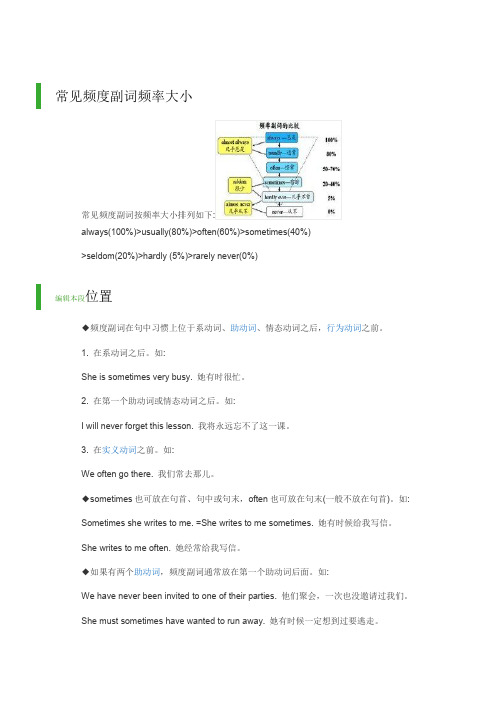
常见频度副词频率大小:编辑本段位置◆频度副词在句中习惯上位于系动词、助动词、情态动词之后,行为动词之前。
1. 在系动词之后。
如:She is sometimes very busy. 她有时很忙。
2. 在第一个助动词或情态动词之后。
如:I will never forget this lesson. 我将永远忘不了这一课。
3. 在实义动词之前。
如:We often go there. 我们常去那儿。
◆sometimes也可放在句首、句中或句末,often也可放在句末(一般不放在句首)。
如:Sometimes she writes to me. =She writes to me sometimes. 她有时候给我写信。
She writes to me often. 她经常给我写信。
◆如果有两个助动词,频度副词通常放在第一个助动词后面。
如:We have never been invited to one of their parties. 他们聚会,一次也没邀请过我们。
She must sometimes have wanted to run away. 她有时候一定想到过要逃走。
编辑本段用法◆always 频率最高,表示动作重复、状态继续,表示"一直、总是",其反义词为never。
always 等与not连用时,表示部分否定。
如:The rich are not always happy. 有钱的人并不总是快乐的。
如果要变为否定句,应将always改为never才能全部否定。
如:Li Ping is always late for school. 李平上学总是迟到。
Li Ping is never late for school.(全部否定)Li Ping is not always late for school. (部分否定)频度副词通常和一般现在时连用,表示动作发生的频率。
区别易混淆的副词、形容词
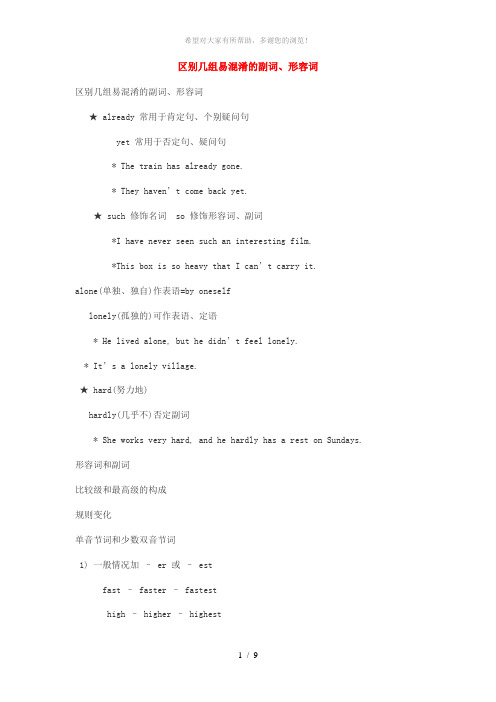
区别几组易混淆的副词、形容词区别几组易混淆的副词、形容词★ already 常用于肯定句、个别疑问句yet 常用于否定句、疑问句* The train has already gone.* They haven’t come back yet.★ such 修饰名词 so 修饰形容词、副词*I have never seen such an interesting film.*This box is so heavy that I can’t carry it.alone(单独、独自)作表语=by oneselflonely(孤独的)可作表语、定语* He lived alone, but he didn’t feel lonely.* It’s a lonely village. ★ hard(努力地)hardly(几乎不)否定副词* She works very hard, and he hardly has a rest on Sundays. 形容词和副词比较级和最高级的构成规则变化单音节词和少数双音节词1) 一般情况加– er 或– estfast – faster – fastesthigh – higher – highestclever – cleverer – cleverest 规则变化单音节词和少数双音节词2) 以字母 e 结尾加–r 或–stfine – finer – finestlate – later – latestnice – nicer – nicest规则变化单音节词和少数双音节词3) 重读闭音节、末尾只有一个辅音字母时双写加–er 或–estfat – fatter – fattestbig – bigger – biggestthin – thinner – thinnest规则变化单音节词和少数双音节词4) 以辅音字母加 y 结尾变 y为 i 加–er 或–estearly – earlier – earliesteasy – easier – easiestlucky – luckier – luckiest规则变化部分双音节和多音节词在词前加 more 或 mostslowly - more slowly - most slowlyeasily - more easily - most easilycarefully - more carefully - most carefully不规则变化good/well – better – bestmany/much – more – mostlittle – less – leastfar – farther – farthest( far – further – furthest )bad/badly/ill – worse – worst形容词和副词比较级和最高级的用法1)表示两者(人或事物)的比较时用比较级,通常用连词 than 引导,表示“较······”或“更······一些”的意思*This cake is more delicious than that one.*Li Lei jumped farther than Jim (did).2) 表示三者或三者以上(人或事物)的比较用最高级,最高级的前面一般要加定冠词the,后面可带of(in,among)短语来说明比较的范围*Shanghai is the biggest city in China.*Lucy sings (the) best of all.*He is the most careful among us.3) 在表示“和······一样······”和“不及······”这类概念时,可以用“as+原级+as”和“not as(so)+原级+as”的句型*Our teacher is as busy as before.*He does not run so (as) fast as I.4) 可用much, still, a little, even, far,three years等表示程度的状语来修饰比较级*She is much taller than Mrs.Liu.*He is three years older than I.*This problem is a little more difficult than the other one.5)几种比较级的使用句型1.“比较级 + and + 比较级”表示“越来越······”*Your English is getting better and better.你的英语越来越好了。
八年级英语第二单元知识点及习题

八年级英语第二单元知识点及习题语言·知识精讲1、How often do you exercise?你多久锻炼一次?(P9 标题)(1)how often 表示“多久一次”。
用来询问动作的频率。
其答语通常是once a day, often, usually, every day, never, sometimes, three times a week等。
比如:---How often do you exercise?你多久锻炼一次?---Once a day. 一天一次。
[拓展]类似表示频率的词汇还有:once in a while (偶尔),seldom(很少),hardly(几乎不),every two weeks(没两个星期)。
其中hardly和seldom在居中表示否定的意义,对这些词汇的提问也用how often。
练习:( )1. --- ______ do you go to the sports club?--- At least once a week.A. How longB. How oftenC. How muchD. How far( ) 2. Tina ______ three times a week. She is very healthy.A. exerciseB. exercisesC. exercising2、help with housework 帮助做家务(P9 1a)(1)help with sth. 意为“帮助做某事”。
如:我的弟弟经常在家帮助做家务。
翻译:My brother often helps with housework at home.【拓展】:①help sb. with sth.= help sb. (to) do sth. 帮助某人做某事②help oneself (to sth.)意为“随便吃(某物);款待”(2)housework是不可数名词,意为“家务劳动;家务活”如:My mother often does the housework on weekends.我的母亲经常周末做家务。
(英语)副词练习题含答案
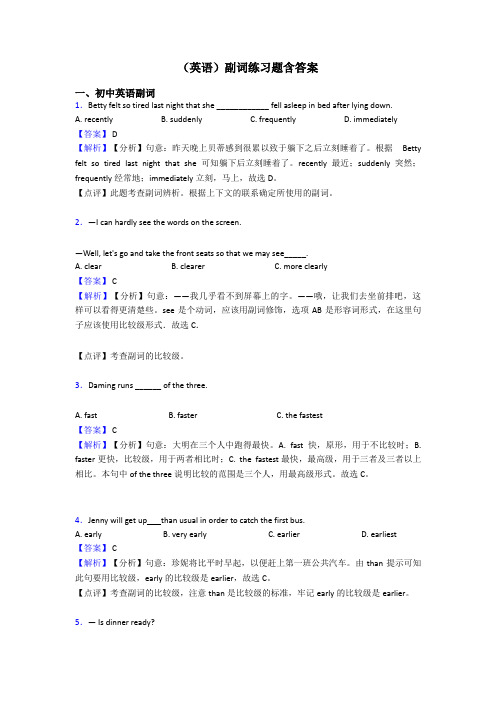
(英语)副词练习题含答案一、初中英语副词1.Betty felt so tired last night that she ____________ fell asleep in bed after lying down.A. recentlyB. suddenlyC. frequentlyD. immediately【答案】 D【解析】【分析】句意:昨天晚上贝蒂感到很累以致于躺下之后立刻睡着了。
根据Betty felt so tired last night that she 可知躺下后立刻睡着了。
recently最近;suddenly突然;frequently经常地;immediately立刻,马上,故选D。
【点评】此题考查副词辨析。
根据上下文的联系确定所使用的副词。
2.—I can hardly see the words on the screen.—Well, let's go and take the front seats so that we may see_____.A. clearB. clearerC. more clearly【答案】 C【解析】【分析】句意:——我几乎看不到屏幕上的字。
——哦,让我们去坐前排吧,这样可以看得更清楚些。
see是个动词,应该用副词修饰,选项AB是形容词形式,在这里句子应该使用比较级形式.故选C.【点评】考查副词的比较级。
3.Daming runs ______ of the three.A. fastB. fasterC. the fastest【答案】 C【解析】【分析】句意:大明在三个人中跑得最快。
A. fast快,原形,用于不比较时;B. faster更快,比较级,用于两者相比时;C. the fastest最快,最高级,用于三者及三者以上相比。
本句中of the three说明比较的范围是三个人,用最高级形式。
故选C。
4.Jenny will get up than usual in order to catch the first bus.A. earlyB. very earlyC. earlierD. earliest【答案】 C【解析】【分析】句意:珍妮将比平时早起,以便赶上第一班公共汽车。
【英语】英语副词及其解题技巧及练习题(含答案)及解析
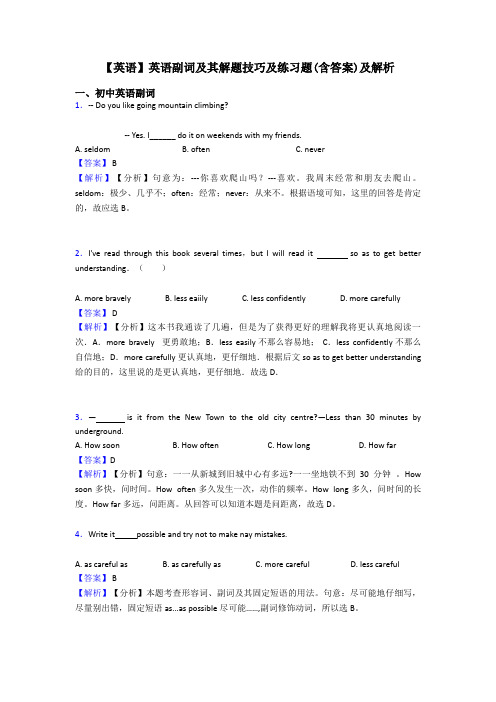
【英语】英语副词及其解题技巧及练习题(含答案)及解析一、初中英语副词1.-- Do you like going mountain climbing?-- Yes. I______ do it on weekends with my friends.A. seldomB. oftenC. never【答案】 B【解析】【分析】句意为:---你喜欢爬山吗?---喜欢。
我周末经常和朋友去爬山。
seldom:极少、几乎不;often:经常;never:从来不。
根据语境可知,这里的回答是肯定的,故应选B。
2.I've read through this book several times,but I will read it so as to get better understanding.()A. more bravelyB. less eaiilyC. less confidentlyD. more carefully【答案】 D【解析】【分析】这本书我通读了几遍,但是为了获得更好的理解我将更认真地阅读一次.A.more bravely 更勇敢地;B.less easily不那么容易地;C.less confidently不那么自信地;D.more carefully更认真地,更仔细地.根据后文so as to get better understanding 给的目的,这里说的是更认真地,更仔细地.故选D.3.— is it from the New Town to the old city centre?—Less than 30 minutes by underground.A. How soonB. How oftenC. How longD. How far【答案】D【解析】【分析】句意:一一从新城到旧城中心有多远?一一坐地铁不到30分钟。
How soon多快,问时间。
How often多久发生一次,动作的频率。
(英语)初中英语副词专项训练100(附答案)
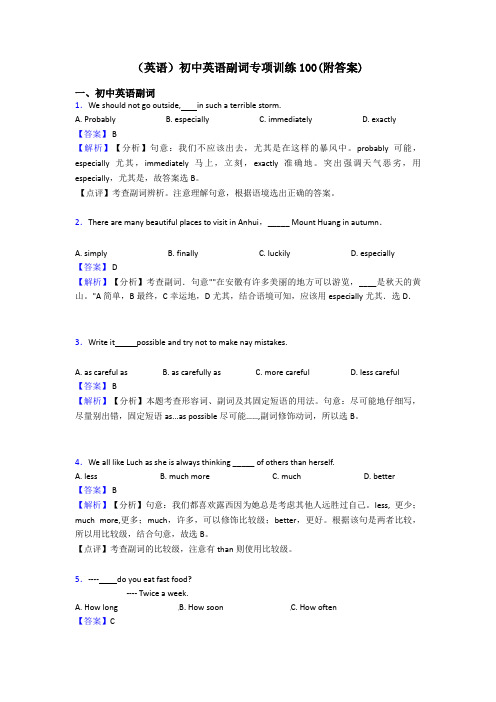
(英语)初中英语副词专项训练100(附答案)一、初中英语副词1.We should not go outside, in such a terrible storm.A. ProbablyB. especiallyC. immediatelyD. exactly【答案】 B【解析】【分析】句意:我们不应该出去,尤其是在这样的暴风中。
probably可能,especially尤其,immediately马上,立刻,exactly准确地。
突出强调天气恶劣,用especially,尤其是,故答案选B。
【点评】考查副词辨析。
注意理解句意,根据语境选出正确的答案。
2.There are many beautiful places to visit in Anhui,_____ Mount Huang in autumn.A. simplyB. finallyC. luckilyD. especially【答案】 D【解析】【分析】考查副词.句意""在安徽有许多美丽的地方可以游览,____是秋天的黄山。
"A简单,B最终,C幸运地,D尤其,结合语境可知,应该用especially尤其.选D.3.Write it possible and try not to make nay mistakes.A. as careful asB. as carefully asC. more carefulD. less careful【答案】 B【解析】【分析】本题考查形容词、副词及其固定短语的用法。
句意:尽可能地仔细写,尽量别出错,固定短语as...as possible尽可能……,副词修饰动词,所以选B。
4.We all like Luch as she is always thinking _____ of others than herself.A. lessB. much moreC. muchD. better【答案】 B【解析】【分析】句意:我们都喜欢露西因为她总是考虑其他人远胜过自己。
【英语】 中考英语副词专项训练100(附答案)
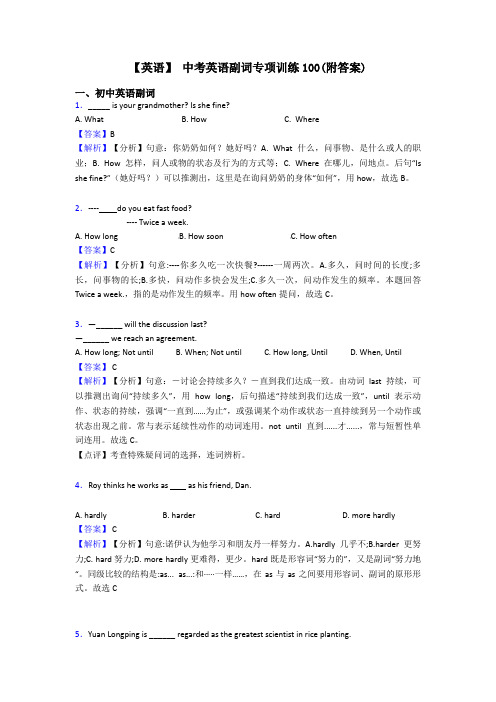
【英语】中考英语副词专项训练100(附答案)一、初中英语副词1._____ is your grandmother? Is she fine?A. WhatB. HowC. Where【答案】B【解析】【分析】句意:你奶奶如何?她好吗?A. What什么,问事物、是什么或人的职业;B. How怎样,问人或物的状态及行为的方式等;C. Where在哪儿,问地点。
后句“Is she fine?”(她好吗?)可以推测出,这里是在询问奶奶的身体“如何”,用how,故选B。
2.----_ do you eat fast food?---- Twice a week.A. How longB. How soonC. How often【答案】C【解析】【分析】句意:----你多久吃一次快餐?------一周两次。
A.多久,问时间的长度;多长,问事物的长;B.多快,问动作多快会发生;C.多久一次,问动作发生的频率。
本题回答Twice a week.,指的是动作发生的频率。
用how often提问,故选C。
3.—______ will the discussion last?—______ we reach an agreement.A. How long; Not untilB. When; Not untilC. How long, UntilD. When, Until【答案】 C【解析】【分析】句意:-讨论会持续多久?-直到我们达成一致。
由动词last持续,可以推测出询问“持续多久”,用how long,后句描述“持续到我们达成一致”,until表示动作、状态的持续,强调“一直到……为止”,或强调某个动作或状态一直持续到另一个动作或状态出现之前。
常与表示延续性动作的动词连用。
not until直到......才......,常与短暂性单词连用。
故选C。
【点评】考查特殊疑问词的选择,连词辨析。
4.Roy thinks he works as as his friend, Dan.A. hardlyB. harderC. hardD. more hardly【答案】 C【解析】【分析】句意:诺伊认为他学习和朋友丹一样努力。
易混淆副词
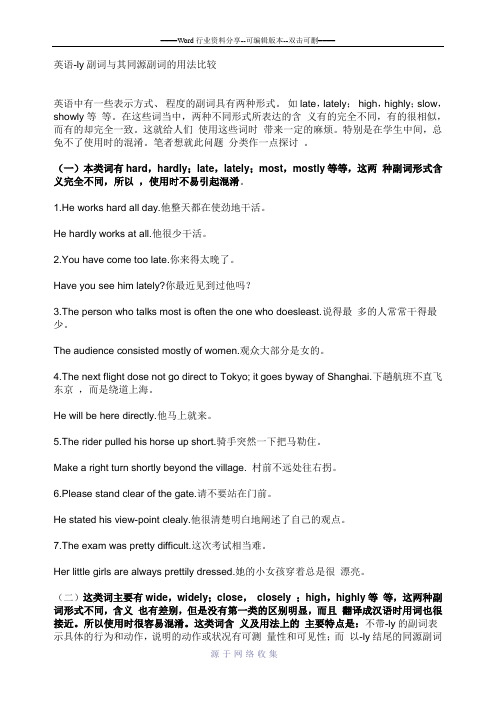
英语-ly副词与其同源副词的用法比较英语中有一些表示方式、程度的副词具有两种形式。
如late,lately;high,highly;slow,showly等等。
在这些词当中,两种不同形式所表达的含义有的完全不同,有的很相似,而有的却完全一致。
这就给人们使用这些词时带来一定的麻烦。
特别是在学生中间,总免不了使用时的混淆。
笔者想就此问题分类作一点探讨。
(一)本类词有hard,hardly;late,lately;most,mostly等等,这两种副词形式含义完全不同,所以,使用时不易引起混淆。
1.He works hard all day.他整天都在使劲地干活。
He hardly works at all.他很少干活。
2.You have come too late.你来得太晚了。
Have you see him lately?你最近见到过他吗?3.The person who talks most is often the one who doesleast.说得最多的人常常干得最少。
The audience consisted mostly of women.观众大部分是女的。
4.The next flight dose not go direct to Tokyo; it goes byway of Shanghai.下趟航班不直飞东京,而是绕道上海。
He will be here directly.他马上就来。
5.The rider pulled his horse up short.骑手突然一下把马勒住。
Make a right turn shortly beyond the village. 村前不远处往右拐。
6.Please stand clear of the gate.请不要站在门前。
He stated his view-point clealy.他很清楚明白地阐述了自己的观点。
7.The exam was pretty difficult.这次考试相当难。
(英语)英语副词练习_英语考试_外语学习含解析

(英语)英语副词练习_英语考试_外语学习含解析一、初中英语副词1.On snowy days, a driver must drive as ____as possible.A. fastB. slowlyC. wiselyD. carefully【答案】D【解析】【分析】句意:在下雪天里,司机必须尽可能小心的开车。
fast快的;slowly慢地;wisely明智地;carefully仔细地。
这四个选项中的词都是副词,用来修饰句中的谓语动词drive。
根据句意可知,下雪天,司机开车要小心,故应选D。
2.—Sarah is chosen as the guide for the Fashion Show.—Great! No one speaks English ________ her.A. as beautiful asB. as badly asC. worse thanD. better than【答案】 D【解析】【分析】句意:——Sarah被选为这次时尚表演的指导。
——太棒了!没有人比她说英语说得更好了。
as beautiful as“和……一样漂亮”;as badly as “和……一样糟糕”; worse than “比……更糟”;better than“比……更好”;否定词+比较级表示最高级。
结合句意,她是最好的,因此被选为指导。
否定词+比较级表示最高级。
故选D。
【点评】考查否定词+比较级表示最高级。
3.Daming runs ______ of the three.A. fastB. fasterC. the fastest【答案】 C【解析】【分析】句意:大明在三个人中跑得最快。
A. fast快,原形,用于不比较时;B. faster更快,比较级,用于两者相比时;C. the fastest最快,最高级,用于三者及三者以上相比。
本句中of the three说明比较的范围是三个人,用最高级形式。
2020年小升初六年级英语语法专项考点精讲+典题突破 专题10《短语辨析》(通用版含答案)

小升初英语语法专项透析专题10《短语辨析》【考点精讲】核心词汇:private, seldom, absent, fail, humorous, helpful, silent, dare, interview,general. 重点短语:1. used to 过去常常2. be afraid of 害怕3. from time to time 时常,有时4. turn red 变红5. take….up 开始做6. deal with 对付、应付7. not….anymore 不再8. tons of attention 很多关注9. worry about 为…..担忧10. be careful 当心11. hang out 闲逛12. give up 放弃13. think about 考虑14. a very small number of…极少数的……15. be alone 独处16. give a speech 做演讲17. in public 当众18. all the time 一直,总是19. on the soccer team 在足球队20. be proud of 为……骄傲21. no longer 不再22. be interested in 对…….感兴趣23. make a decision 做决定24. in person 亲自25. to one’s surprise 令某人吃惊的是26. change one’s life 改变某人的生活27. even though 尽管28. take care of 照顾29. think of 关心、想着30. 30. take pride of 为……感到自豪31.31. pay attention to 对…..注意,留心32.32. one of………….之一33. in the last few years 在过去的几年里34.固定词组:1. used to do sth. 过去常常做某事2. be afraid of doing sth害怕做某事3. give up doing sth. 放弃做某事4. have to do sth. 必须做某事5. make sb. do sth. 让某人做某事6.6. try to do sth. 尽力做某事7. adj. + enough to do sth. 足够……而能做某事8. be prepared to do sth. 准备做某事9. see sb. doing sth. 看见某人在做某事10. take up doing sth. 开始做某事11. begin to do sth. 开始做某事12. require sb. to do sth. 要求某人做某事13. decide to do sth. 决定做某某14. make a decision to do sth. 决定做某事15. It’s hard to believe that……很难相信……….16. It has been + 一段时间+ since + 从句用一般过去时自从……以来已经有很长的时间了17. dare to do sth. 敢于做某事18. It’s + adj. + for sb. + to do sth. 对某人来说做某事是……的重点句型:1. I used to be afraid of the dark. 我过去常常怕黑。
频度副词

频度副词(Adverbs of Frequency)一、频度副词是用来回答how often(经常与否,多久一次)这样问题的副词。
常用的频度副词有:always, almost always, usually, often, sometimes, hardly ever (seldom), never等。
这些频度副词在频度差异上可以这样表示:always (100%) > almost always>usually > often > sometimes > hardly ever (0%)always意为“总是”, 表示动作的重复或状态的延续。
usually意为“通常”, 表示很少有例外。
often意为“经常”, 表示动作的重复, 但不如usually那么频繁, 中间有间断。
sometimes意为“有时”, 表示动作偶尔发生。
hardly意为“几乎不”, 常和ever连用表示强调。
never意为“从未”。
二、频度副词通常放在动词前面,若句子里有情态动词、助动词或系动词be,则放在这类动词(第一个)的后面。
三、由wh- 和how 引导的特殊疑问句以及对应的答语。
如:What do/does +主语+频度副词+V.原+…?How often + 助动词do /does (或did) + 主语+ do sth.?What do you usually do on weekends?你通常周末做什么?I usually listen to music.我通常听音乐。
How often do you go to the factory?你多久去一次工厂?I go to the factory twice a week.我两周去一次。
How often do you exercise? 你(你们)多久锻炼一次身体?四、总结:how often“多久一次”询问动作的频率。
答语:(1)every+名词单数everymorning/afternoon/evening/day/Sunday/weekend/week/ month/term/year/…(2)次数+一段时间once a day / twice a week / once or twice a year / two or three times(3)频度副词always---usually---often=all the time=at times---sometimes---hardly ever---never =seldom。
频率副词的使用用法

频率副词的使用用法文稿归稿存档编号:[KKUY-KKIO69-OTM243-OLUI129-G00I-FDQS58-频率副词的使用用法几个频率副词的用法★alwaysalways 意为“总是”,与进行时态连用时,可以表示赞扬,也可以表示讨厌等感情色彩。
E.g. (1)I shall always remember my first day at school.我将永远记住我上学的第一天。
(2)He is always smoking. 他总是抽烟。
★usuallyusually可以指通常的动作,但是侧重已经形成的习惯,它是从已经形成的角度来说明动作。
e.g.(1)I usually do some shopping with my parents on Sundays.我经常在星期天和我的父母一起去买东西。
(2)He usually goes to school by bike. 他通常骑自行车上学。
★oftenoften是指经常性的动作,意思为“常常, 经常”。
e.g.(1)Children don't often do homework. 孩子们经常不写作业。
(2)He is often late for school. 他经常上学迟到。
★sometimessometimes意思为“有时,不时”,表示次数较少(低于often所表达的次数),常常与一般现在时或一般过去时连用。
e.g. (1)Sometimes he goes to work by bike, and sometimes he goes by bus.有时候他骑自行车上班,有时候他乘公共汽车上班。
(2) Sometimes I helped my parents in the house.有时候我帮助父母做家务。
★hardlyhardly可以用于表频率外的一切表示“几乎不、几乎没有”的,意义上等于no或note.g.(1)He hardly drinks. 他几乎不喝酒。
初中英语相似词语辨析(三)
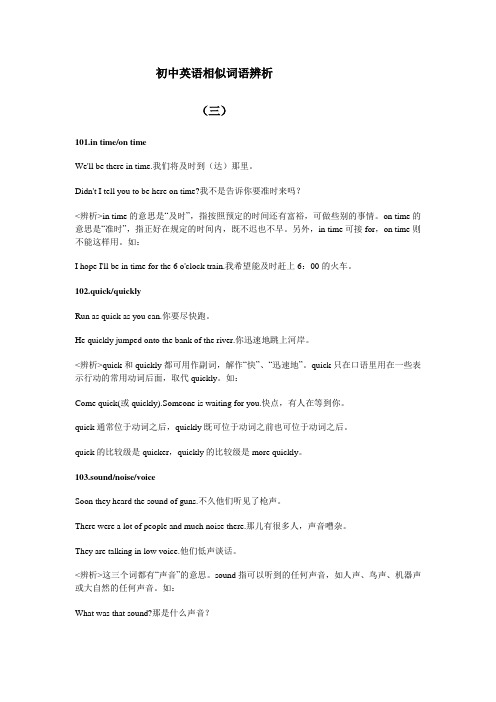
初中英语相似词语辨析(三)101.in time/on timeWe'll be there in time.我们将及时到(达)那里。
Didn't I tell you to be here on time?我不是告诉你要准时来吗?<辨析>in time 的意思是“及时”,指按照预定的时间还有富裕,可做些别的事情。
on time 的意思是“准时”,指正好在规定的时间内,既不迟也不早。
另外,in time 可接 for,on time 则不能这样用。
如:I hope I'll be in time for the 6 o'clock train.我希望能及时赶上6:00的火车。
102.quick/quicklyRun as quick as you can.你要尽快跑。
He quickly jumped onto the bank of the river.你迅速地跳上河岸。
<辨析>quick 和 quickly 都可用作副词,解作“快”、“迅速地”。
quick 只在口语里用在一些表示行动的常用动词后面,取代 quickly。
如:Come quick(或 quickly).Someone is waiting for you.快点,有人在等到你。
quick 通常位于动词之后,quickly 既可位于动词之前也可位于动词之后。
quick 的比较级是 quicker,quickly 的比较级是 more quickly。
103.sound/noise/voiceSoon they heard the sound of guns.不久他们听见了枪声。
There were a lot of people and much noise there.那儿有很多人,声音嘈杂。
They are talking in low voice.他们低声谈话。
<辨析>这三个词都有“声音”的意思。
高考常考易混点:两种形式的副词
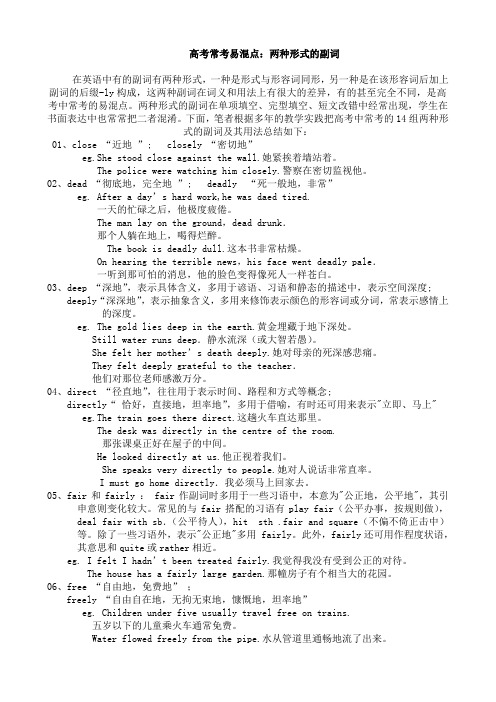
高考常考易混点:两种形式的副词在英语中有的副词有两种形式,一种是形式与形容词同形,另一种是在该形容词后加上副词的后缀-ly构成,这两种副词在词义和用法上有很大的差异,有的甚至完全不同,是高考中常考的易混点。
两种形式的副词在单项填空、完型填空、短文改错中经常出现,学生在书面表达中也常常把二者混淆。
下面,笔者根据多年的教学实践把高考中常考的14组两种形式的副词及其用法总结如下:01、close “近地”; closely “密切地”eg.She stood close against the wall.她紧挨着墙站着。
The police were watching him closely.警察在密切监视他。
02、dead “彻底地,完全地”; deadly “死一般地,非常”eg. After a day’s hard work,he was daed tired.一天的忙碌之后,他极度疲倦。
The man lay on the ground,dead drunk.那个人躺在地上,喝得烂醉。
The book is deadly dull.这本书非常枯燥。
On hearing the terrible news,his face went deadly pale.一听到那可怕的消息,他的脸色变得像死人一样苍白。
03、deep “深地”,表示具体含义,多用于谚语、习语和静态的描述中,表示空间深度;deeply“深深地”,表示抽象含义,多用来修饰表示颜色的形容词或分词,常表示感情上的深度。
eg. The gold lies deep in the earth.黄金埋藏于地下深处。
Still water runs deep.静水流深(或大智若愚)。
She felt her mother’s death deeply.她对母亲的死深感悲痛。
They felt deeply grateful to the teacher.他们对那位老师感激万分。
同义形容词-副词-名词-动词的对比-初中英语

Successful (adj)成功的He is a successful businessman and owns a big company. /他是一个成功的商人,拥有一个大公司。
Success (n) 成功--how about the charity show?--I should say it was a success. /应该是很成功。
Working hard can lead a success. /尽力工作通向成功。
differently (adv) 不同凡响地You try to do everything differently. /你尽力不同凡响地做每件事。
different (adj) 不同凡响的It’s unfair to treat different people in different way./对待不同的人用不同的方式是不公平的。
短语:be different from / 与----不同relaxed (adj)感到放松的《通常常利用来形容人》The programme made me relaxed./这个节目使我感到很放松。
relaxing(adj)令人放松的《通常指事物》The relaxing music made me feel sleep./这令人放松的音乐使我感到昏昏欲睡。
relax(v)放松Try to relax.don’t worry./尽可能放松,别担忧。
affect(v)影响My grandfather affected me too much./我爷爷对我影响很大。
effect(n)影响,结果,效果,have effect on sb/sth. 对某人/某事产生影响。
It is reported that parents’ eating habits have a great effect on their children./据报导,父母的饮食习惯对孩子有很大影响。
大学英语相似词辨析(75):hardly,scarcely
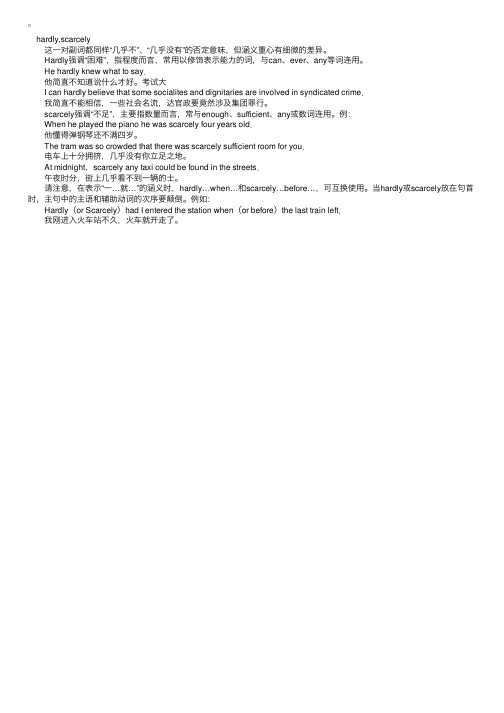
hardly,scarcely 这⼀对副词都同样“⼏乎不”、“⼏乎没有”的否定意味,但涵义重⼼有细微的差异。
Hardly强调“困难”,指程度⽽⾔,常⽤以修饰表⽰能⼒的词,与can、ever、any等词连⽤。
He hardly knew what to say. 他简直不知道说什么才好。
考试⼤ I can hardly believe that some socialites and dignitaries are involved in syndicated crime. 我简直不能相信,⼀些社会名流,达官政要竟然涉及集团罪⾏。
scarcely强调“不⾜”,主要指数量⽽⾔,常与enough、sufficient、any或数词连⽤。
例: When he played the piano he was scarcely four years old. 他懂得弹钢琴还不满四岁。
The tram was so crowded that there was scarcely sufficient room for you. 电车上⼗分拥挤,⼏乎没有你⽴⾜之地。
At midnight,scarcely any taxi could be found in the streets. 午夜时分,街上⼏乎看不到⼀辆的⼠。
请注意,在表⽰“⼀…就…”的涵义时,hardly…when…和scarcely…before…,可互换使⽤。
当hardly或scarcely放在句⾸时,主句中的主语和辅助动词的次序要颠倒。
例如: Hardly(or Scarcely)had I entered the station when(or before)the last train left. 我刚进⼊⽕车站不久,⽕车就开⾛了。
hardly的同义词

hardly的同义词hardly表几乎不; 简直不的意思,那么你知道hardly的同义词有哪些吗?接下来小编为大家整理了hardly的同义词,希望对你有帮助哦!hardly的同义词辨析:hardly, scarcely, barely这些副词均含"几乎不"之意。
hardly :指接近最低限度,差不多没有多余,强调困难和程度。
scarcely :指不太充分,不太够,不足,不能令人满意,强调数量。
barely :指仅仅够,一点不多,强调没有多余。
词组习语:hardly any1. 几乎没有他们几乎连一本书都没有卖掉。
they sold hardly any books.2. 几乎没人几乎没人有前科。
hardly any had previous convictions.hardly ever1. 很少我们很少见到他们。
we hardly ever see them.hardly的例句:1. The ward was busy and Amy hardly had time to talk.病房里非常忙碌,埃米几乎没有时间说话。
2. My eyes were so swollen I could hardly see.我的眼睛肿得很厉害,几乎看不到东西。
3. Their two faces were hardly more than eighteen inches apart.他俩的脸相隔还不到18英寸。
4. Half-ruined, hardly a building untouched, it's a desolate place.这里大半遭毁,几乎没有一栋建筑完好无损,变成了一块荒废之地。
5. He appeared hardly capable of conducting a coherent conversation.他好像连话都说不清楚。
6. Far from being relaxed, we both felt so uncomfortable we hardly spoke.我们两人非但没有放松,反而都感觉很不自在,几乎没有说话。
- 1、下载文档前请自行甄别文档内容的完整性,平台不提供额外的编辑、内容补充、找答案等附加服务。
- 2、"仅部分预览"的文档,不可在线预览部分如存在完整性等问题,可反馈申请退款(可完整预览的文档不适用该条件!)。
- 3、如文档侵犯您的权益,请联系客服反馈,我们会尽快为您处理(人工客服工作时间:9:00-18:30)。
相似词辨析:rarely, seldom, hardly和scarcely Rarely, seldom, hardly和scarcely,这几个词一定让你很头晕吧?今天我们就来看看,在朗文词典上对这几个词是如何辨析的!
Rarely and seldom both mean 'not often'. Seldom is more formal or literary. Rarely和seldom意思都是“很少”(表频率),seldom更正式、更书面。
• People rarely ask que stions.
人们很少问问题。
• She was seldom seen in public.
很少在公众场合看见她。
Hardly and scarcely both mean 'almost not' or 'only just'. For example, if you hardly had time to do something, you almost did not have time. Scarcely is more formal or literary.
Hardly和scarcely意思都是“几乎不”或者“刚刚”(表程度)。
例如:you hardly had time to do something意味着你几乎没时间做某事。
相比之下scarcely更正式、更书面。
• I hardly had time to ask her name.
我几乎没时间去问她叫什么名字。
• We had scarcely arrived when he asked us to leave.
我们才刚刚到他就叫我们走了。
Hardly and scarcely can also be used with 'ever' to mean 'not often, almost never', with 'any' to mean 'very few, almost none'.
Hardly和scarcely也可以与ever连用,表示“很少,几乎从不”;与any连用,表示“很少,几乎没有”。
• I've got hardly any money left.
我几乎没剩一点钱。
• Hardly anyone a gre ed with her.
几乎没人同意她。
In speech, it is usual to say that you hardly ever do something, rather than that you rarely do it.
在演讲时,通常都说hardly ever do something,而不说rarely do something。
• I hardly ever go to the cinema.
我几乎从不去电影院。
